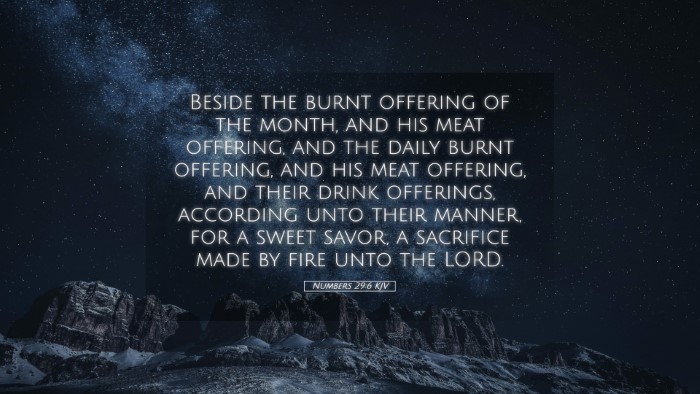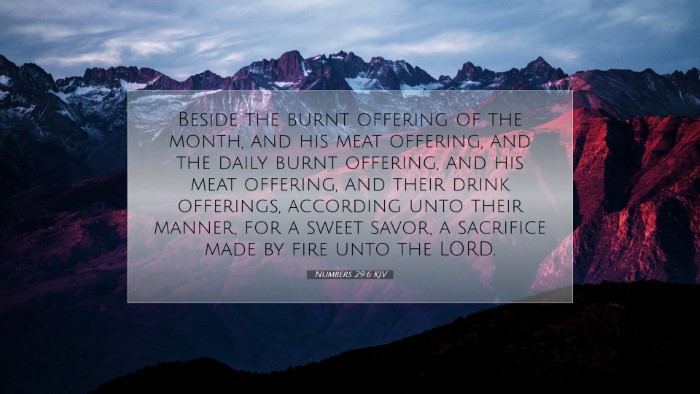Commentary on Numbers 29:6
Numbers 29:6 states: "Besides the burnt offering of the month, and his meat offering, and the daily burnt offering, and his meat offering, and their drink offerings, according unto their manner, for a sweet savour, a sacrifice made by fire unto the LORD."
General Overview
This verse is part of a larger section regarding the sacrificial systems established for the Israelites. Numbers 29 outlines the various offerings prescribed during the Feasts, emphasizing the significance of these rituals in maintaining the covenant relationship between God and His people.
Significance of Offerings
The offerings mentioned—burnt and grain offerings—serve to acknowledge God's sovereignty and grace. They represent the devotion of the people and their desire for communion with the divine.
- Burnt Offerings: Symbolize total dedication to God as the entire offering is consumed, illustrating the concept of surrender.
- Meat Offerings: Acknowledged God’s provision and encouraged gratitude among the faithful.
- Drink Offerings: Further symbolize the pouring out of oneself in service to God, indicative of a worshipful heart.
Insights from Matthew Henry
Matthew Henry emphasizes that the details of the sacrificial system highlight God's desire for order and reverence in worship. He notes that the term "sweet savour" indicates God's acceptance of the sacrifices, which signifies a proper heart attitude in the worshippers. Henry suggests that these offerings were designed to keep the people continually aware of their dependence on God's grace and kindness.
Insights from Albert Barnes
Albert Barnes elaborates on the importance of ritual and form in worship as prescribed in this passage. He explains that the meticulous nature of the offerings served to unify the community in worship. Barnes also points out that the mention of "sacrifice made by fire" highlights the concept of purification—fire representing God's holiness and the need for the sin offering to turn away His wrath.
Insights from Adam Clarke
Adam Clarke provides a detailed explanation of the various components of these offerings, emphasizing the significance of each element. He observes that these offerings should be made "according to their manner," suggesting that they were to be done with precision and devotion. Clarke also touches on the theological implications of sacrifice, noting that the act of sacrifice points to the coming of Christ, who would ultimately fulfill the requirements of the law with His own offering.
Theological Reflections
Within Numbers 29:6, we see the intersection of worship, community, and sacrificial theology. Pastors and theologians are invited to reflect on how these principles translate into today's practices. The rituals illustrate the seriousness of sin and the necessity of atonement, while also offering a framework for understanding grace and mercy in the light of Christ's ultimate sacrifice.
- Worship: Consider how the act of worship is more than mere ritual; it is an expression of the heart's response to God's love.
- Community: Reflect on the importance of unity in worship and how communal sacrifices fortify our bonds as believers.
- Redemption: Contemplate the foreshadowing of Christ's sacrifice evident in the practice of offerings, portraying the depth of God's redemptive plan.
Conclusion
Numbers 29:6 serves as a reminder of the fidelity required in worship and the profound implications of sacrificial practices. By examining the insights of Matthew Henry, Albert Barnes, and Adam Clarke, we deepen our understanding of the text and its application to our spiritual lives as followers of Christ. The offerings are not merely historical practices but are imbued with meaning that transcends time, inviting us into a richer relationship with God today.


